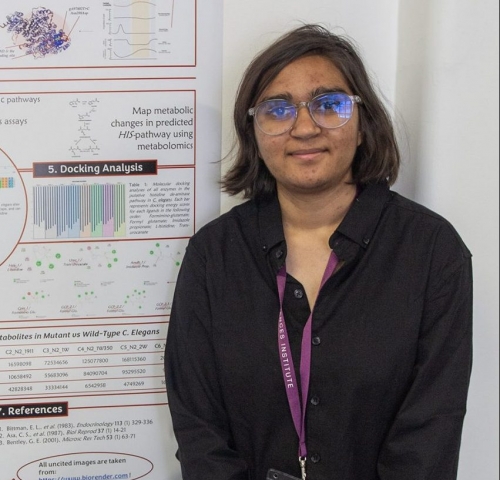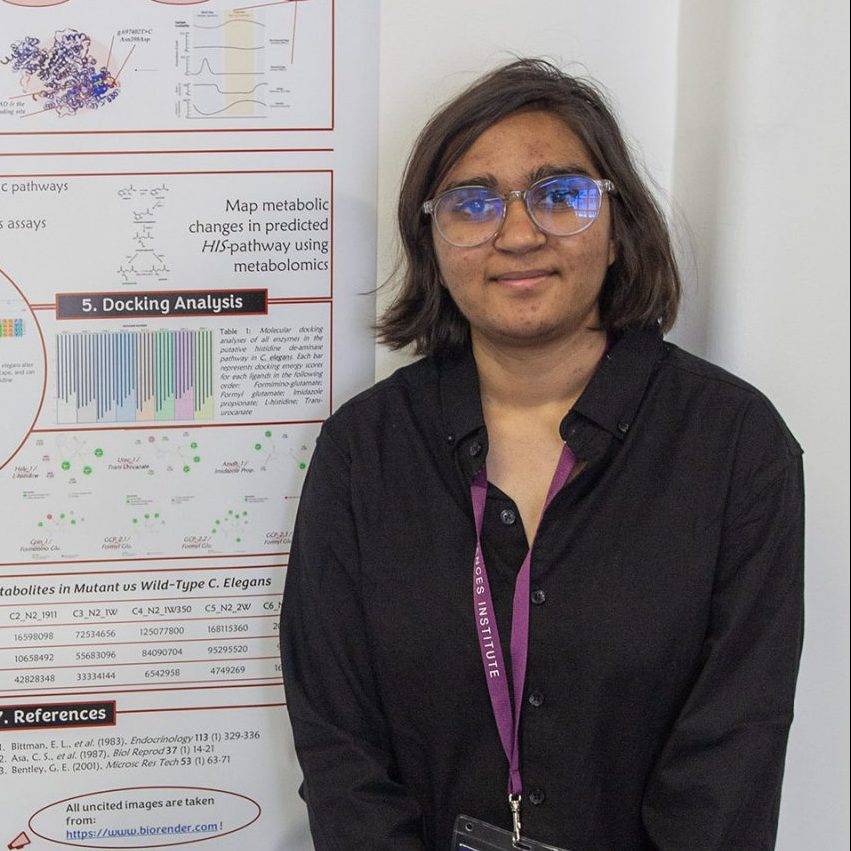
Urooji Ali
The University of Sydney
Urooj Ali is an accomplished researcher, writer, and academic dedicated to advancing scientific knowledge and promoting global well-being. Currently pursuing a PhD at the University of Sydney as an Australian Research Council International Scholar, Urooj’s research focuses on the exploration of a pathway other than melatonin playing role in reproductive behaviour. Urooj holds a gold medal in her MPhil Biotechnology degree from Quaid-e-Azam University, Pakistan, where she contributed to cutting-edge research on biofabrication and diabetic wound healing. With another gold medal in Biotechnology from The University of Central Punjab, Urooj has consistently demonstrated academic excellence, serving as a research coordinator and mentoring graduate students. As a visiting lecturer, Urooj taught bioinformatics, equipping students with industry-relevant skills. With 20+ research publications in high-impact journals, Urooj has made notable contributions to computational biology, vaccine development, and artificial intelligence applications in healthcare. She has also presented at multiple international conferences, hosting bioinformatics workshops and engaging in science communication. A passionate leader and humanitarian, Urooj has led community initiatives, organized research symposiums, and contributed to welfare projects. Driven by curiosity and a commitment to scientific progress, Urooj continues to push boundaries, combining multidisciplinary approaches to solve real-world challenges.
Can you give me a quick overview of the type of mathematics you are studying and its potential applications or outcomes?
While my work is primarily experimental, I attended this bioinformatics conference to explore how computational tools are advancing biological research. I was particularly interested in how data-driven approaches, like machine learning and metabolomics analysis, could add to our understanding of metabolic networks. Although bioinformatics isn’t a core part of my project, I’m keen to see if integrating computational methods could provide new insights into my research or refine my experimental design.
How did you get into the mathematical sciences/bioinformatics?
My inspiration to explore bioinformatics and computational sciences came from my undergraduate supervisor, Dr. Muhammad Naveed. Back in 2018, he often emphasized that machine learning and bioinformatics would shape the future of science. His vision encouraged me to stay curious about how computational approaches could revolutionize biological research.
If you could give advice to your younger self, what would it be?
If I could give advice to my younger self—or anyone starting out in the mathematical sciences—it would be this: It all seems daunting at first, especially the lengthy codes and complex concepts, but take it one step at a time. It’s easy to feel overwhelmed and push yourself too hard out of fear that you’re not doing enough. But true progress comes from finding your own pace and growing with it. Mastery isn’t about rushing—it’s about steady learning, patience, and consistency. Trust the process, stay curious, and don’t be afraid to ask questions. Over time, things will start to make sense, and you’ll realize just how much you’ve learned along the way.
What was your motivation for attending AMSI BioInfoSummer?
My AMSI BioInfoSummer experience was fantastic! First, I love Melbourne and UniMelb, so that was already a great motivation. But more importantly, my supervisor was really keen on me attending, assuring me it would be an amazing experience—and she was absolutely right. The conference was incredibly well-organized, with brilliant speakers and discussions. However, since it was quite advanced and specific, I didn’t gain much that directly applied to my project. That said, it was a great opportunity to explore the latest advancements in bioinformatics and mathematical sciences, and it gave me insights into how these fields are evolving. If a peer’s research involves heavy bioinformatics or computational modeling, I would 100% recommend they attend—it’s a goldmine of knowledge. Plus, I loved the college where I stayed, met some amazing people, and had intellectually stimulating conversations. Overall, it was an experience worth having!
You received an AMSI BioInfoSummer travel grant to attend AMSI BioInfoSummer. How important was this in terms of your ability to attend and fully participate in the sessions throughout the week?
Receiving the AMSI BioInfoSummer travel grant made a huge difference in my ability to attend the conference in person. As a student living solely on a scholarship, funding travel and accommodation for such events can be challenging. Without this grant, attending would have been difficult, if not impossible. One of the best parts of the grant was that it included on-campus accommodation, which made getting to and from the conference venue incredibly easy. This not only saved time and effort but also allowed me to fully participate in all sessions and networking opportunities without any logistical stress. Conferences like these are invaluable for learning, networking, and staying updated with the latest advancements in the field. However, for many students, participation depends on the financial support available. I truly appreciate the organizers’ commitment to accessibility, as it ensures that students and early-career researchers can benefit from these experiences regardless of financial constraints. This grant allowed me to fully enjoy the sessions, interact with experts, and explore potential applications of bioinformatics in my work—opportunities that I wouldn’t have had otherwise.
What was your main take away from AMSI BioInfoSummer?
The most valuable takeaway from AMSI BioInfoSummer was the exposure to cutting-edge research in bioinformatics and how it is shaping the future of biological research. While my work is primarily experimental, attending the conference helped me appreciate the power of computational approaches in solving critical biological problems. One of the highlights was interacting with researchers and professionals from diverse backgrounds. These conversations gave me fresh perspectives on how bioinformatics tools could potentially be integrated into my research. I also learned about career opportunities in computational biology, which I hadn’t considered before. Beyond the technical learning, the conference reinforced the importance of interdisciplinary collaboration—seeing how bioinformatics bridges biology, mathematics, and data science was truly inspiring. The networking opportunities were invaluable, and I left with new connections that could lead to exciting collaborations in the future. Overall, AMSI BioInfoSummer broadened my understanding of the field, introduced me to new possibilities, and added to my appreciation for the role of bioinformatics in modern science.
Where do you want the mathematical sciences to take you? Where do you see yourself in five- or ten-years’ time?
In the next 5–10 years, I definitely see myself exploring wholistic cell modeling. Adriana’s session at AMSI BioInfoSummer was really inspiring—it introduced me to the concept in a way that left me curious and excited to explore it further. Another idea that truly resonated with me was the in silico design of cells, which aligns perfectly with my passion of combining experimental and computational biology. Seeing how mathematical modeling can be used to simulate, predict, and manipulate cellular behavior opened a whole new perspective on research for me. Looking ahead, I hope to be actively involved in this field, contributing to the development of computationally designed biological systems. A long-term goal of mine is to work with Cell Bauhaus, a research group pioneering in this space. Their work represents exactly the kind of innovation that excites me, and I’d love to be a part of it in the future. AMSI BioInfoSummer not only introduced me to these new career pathways but also reinforced the importance of interdisciplinary research, showing me how computational approaches can revolutionize biological sciences. This experience has definitely shaped my long-term aspirations.
Is there anything else you’d like to share about your experience or feedback on AMSI BioInfoSummer or the travel grant?
My AMSI BioInfoSummer experience was truly memorable, and I’m incredibly grateful for the travel grant that made it possible. The conference itself was exceptionally well-organized, and I was really impressed by the level of detail and planning that went into making everything run smoothly. Apart from the academic experience, I absolutely loved staying at the University College of UniMelb—the room, the kitchen service—ahh, it was wonderful! It truly felt like home. A special shoutout to Angela—her warmth and kindness made a real difference. She made everyone feel so welcome, and her energy added to the positive atmosphere of the event. I appreciate the support and generosity of the organizers, and I hope to stay connected with this amazing network in the future!

